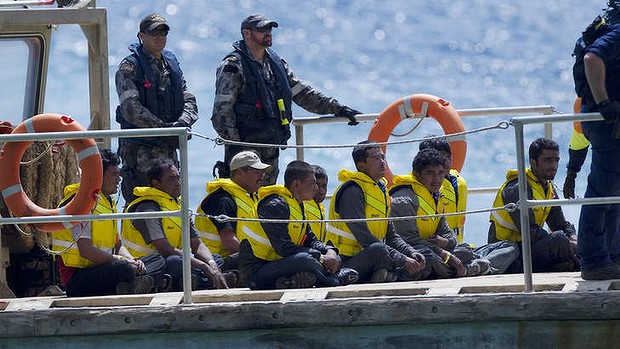IN THE MEDIA
Stop the ugly politicking: this is a matter of life and death
August 5, 2013 | Mark Leibler

The Age, August 3, 2013
Mark Leibler
It chills me that we have come to a point where we are denying refugees reaching Australian waters any prospect of ever being settled in this country.
When we demonise those who arrive by boat, we simply fuel fear in the community, leaving us all feeling helpless and confused, to say nothing of the mental health effects on the refugees concerned. To add to that, reports of conditions at various offshore processing centres, including Manus Island, are deeply disturbing. They require top-level investigation as a matter of urgency.
We are asked to judge which policy or slogan we prefer. Which policy is more likely to succeed in stopping the boats? These are the wrong questions.
It is time for our politicians to lead us out of this miasma. They should start by committing to remove this issue from the election campaign hothouse, and admitting that both sides of politics might have something to contribute to a more equitable and effective resolution.
I fear that by appealing to the basest instincts in our society Australians are being led into a dangerous void, filled by fear – in some cases, xenophobic – and vilification. Down this path lie vulnerable refugees fleeing persecution and, while deserving of our empathy, they are instead left degraded and dehumanised.
As a person of Jewish faith, I have long understood what racism does to people. It takes away your right to control your destiny or to make decisions for yourself. To stay or go becomes a matter of life or death.
My family will certainly never forget our debt to Australia in this regard. We found sanctuary here after racism in Europe condemned my maternal grandparents to being murdered at Auschwitz, and in 1939 drove my parents from Belgium and the Nazis to this country.
We owe our freedom, prosperity and the very lives of our children and grandchildren to this great country – one of the most democratic on earth. Yet we know the reality is that racism can’t simply be dismissed as belonging to another place or time.
Racism and its impacts on people’s lives continue to cast a shadow in Australia. In my firm’s recent representation of a group of young African Australians in their ”racial profiling” action against Victoria Police, we witnessed first-hand the mental health effects of institutional racism – stress, fear, anxiety and depression, and poor self-worth, self-efficacy and self-esteem, all leading to suicidal thoughts.
Racism is even embedded in the very architecture of this country, with the ”race power” and associated provisions in our nation’s constitution.
My own reconciliation journey has been enriched by learning from many indigenous Australians about their dignified struggles for justice, as they battle the impacts of racism in their daily lives.
It has been only through a politically bipartisan approach to reconciliation that we have achieved the apology and significant momentum towards securing the just recognition of indigenous Australians in our constitution, and the removal of racist provisions within it.
We clearly need to replicate the same bipartisanship in population and asylum-seeker policy. The thing that most disturbs me about the current style of debate is the seeming incapacity of so many Australians to try ”walking in the shoes” of those who arrive here seeking refuge from persecution. Surely it can’t be that hard. For millions of Australians, that journey can simply begin by looking back into their own family’s migrant story.
We as a nation deserve better. Let’s prevail on our leaders to step back and together explore longer-term strategies, more fitting to our record as a nation that embraces a ”fair go” for refugees fleeing persecution. We have dealt with these issues successfully before with dignity and humanity, for example in the late 1970s after the Vietnam War.
Our leaders, too, are better than this. Surely they are capable of focusing on the nation’s best interests, and devoting their strength to articulating how they see our future. Part of that future must be how we can make a safe place for refugees escaping persecution, and at the same time minimise security risks and prevent any further deaths at sea.
Outside the heat of an election campaign we must start talking about how many refugees Australia should accept each year, given our history, our relative wealth, and our moral obligation to contribute to the global refugee crisis.
I favour a regional approach, which does not rely on just one small country in the region bearing the brunt of the resettlement challenge. The chief of World Vision, Tim Costello, having spent a lot of time in refugee camps, has recently pointed out what most of us know instinctively, that most refugees would want to go home if it was safe to do so. Those who simply can’t return home due to the risk of persecution need us to work with UN agencies and others to develop a co-ordinated response to this regional and global problem.
Population policy, particularly concerning vulnerable people whose lives are in immediate danger, should never be just another election battle. This issue is far too important to score political points over.
Mark Leibler AC is senior partner at Arnold Bloch Leibler, national chairman of the Australia-Israel and Jewish Affairs Council and co-chairman of the Expert Panel on Constitutional Recognition of Indigenous Australians.
Tags: Australasia





